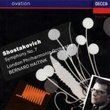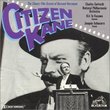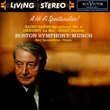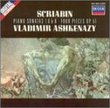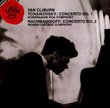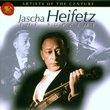| All Artists: Luigi Boccherini, Fabio Biondi, Enrico Casazza, Europa Galante, Ernesto Braucher, Maurizio Naddeo, Antonio Fantinuoli Title: Boccherini: String Quintets; Minuet in A /Europa Galante * Biondi Members Wishing: 1 Total Copies: 0 Label: Virgin Veritas Release Date: 5/8/2001 Genres: Dance & Electronic, Classical Styles: Chamber Music, Historical Periods, Classical (c.1770-1830) Number of Discs: 1 SwapaCD Credits: 1 UPCs: 724354542121, 724354542152 |
Search - Luigi Boccherini, Fabio Biondi, Enrico Casazza :: Boccherini: String Quintets; Minuet in A /Europa Galante * Biondi
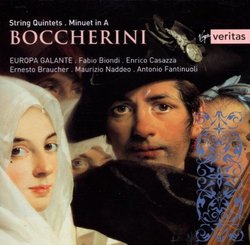 | Luigi Boccherini, Fabio Biondi, Enrico Casazza Boccherini: String Quintets; Minuet in A /Europa Galante * Biondi Genres: Dance & Electronic, Classical
Boccherini wrote about 100 string quintets, and if the three on this disc are anything to go by, they're a treasure trove of inventive music, melodically rich, full of surprising twists and turns, and with moments of great... more » |
Larger Image |
CD DetailsSynopsis
Amazon.com's Best of 2001 Boccherini wrote about 100 string quintets, and if the three on this disc are anything to go by, they're a treasure trove of inventive music, melodically rich, full of surprising twists and turns, and with moments of great depth (as in the austerely beautiful Larghetto that opens the D minor Quintet). Written during Boccherini's stint as court composer in Madrid, these are "can't-miss" pieces, as is the encore track, the delicious Minuet from the Quintet Opus 11 No. 5, beloved by film fans for its use as a plot device in Alec Guinness's 1955 British comedy, The Ladykillers. The sympathetic playing of these musicians, drawn from the outstanding period performance band Europa Galante, makes this a major addition to the catalogue. The group's leader and first violinist on this disc is Fabio Bondi, whose solo recordings establish him as perhaps the finest of period practitioners. He shines in his solo turns, his colleagues play with spirited abandon, and the result is as delightful an hour of listening as you're likely to find on disc. --Dan Davis Similarly Requested CDs
|
CD Reviews...and there was much rejoicing Jonathan J. Casey | the twin cities | 05/16/2001 (5 out of 5 stars) "There is a shameful dearth of recordings of Boccherini's string quintets in today's marketplace. Why such a masterful group of works goes untouched is a mystery to me, but it was with great pleasure that I snapped up this marvelous CD by Fabio Biondi and his Europa Galante cohorts. This disc is everything you would hope for in a chamber music recording: excellent recorded sound; sharp, witty playing; and intriguing compositions. I have yet to be bored by any of Boccherini's works, and am surprised that these hundred-some string quintets (with two cellos) are not treated with the same level of respect as, say, Scarlatti's sonatas. The inclusion of the famous minuet from Op. 11 no. 5 is a little gratuitous, but the players take at it with such verve that I can hardly complain. Seek out the Smithsonian Chamber Players' out-of-print recording of Op. 11 nos. 4, 5 and 6 on DHM. The Op. 11 quintets feature more virtuosic writing for the cello than these Op. 25 quintets, which are a nice vehicle for Biondi's considerable talents (though the group as a whole performs very well together). Really fascinating music. If you're a lover of the Classical era, of Boccherini, or of chamber music in general, I highly recommend this CD. I hope there's more to come." If you enjoy Haydn and Mozart.... Giordano Bruno | Wherever I am, I am. | 04/01/2008 (5 out of 5 stars) "...it stands to reason that you might like Luigi Boccherini as well. He was an eminently successful composer of the same era (1743-1805), a famous cello virtuoso and a rival in fame to Haydn amongst his contemporaries. But he's also had a reputation as a lightweight - Haydn's Wife, he was mockingly called - and he's lacked the modern symphonic advocacy that Mozart has enjoyed. Besides, his music is outside my own performing repertoire, which concentrates on the 16th & 17th centuries. So I've ignored him. I've skipped concerts featuring his works. 'There's only so much listening time in a life,' I've thought... ...but sometimes a single brilliant performance can compel a guy to open his ears. That's what has happened to me with old Luigi. A few weeks ago I came upon this CD of Boccherini's String Quintets, performed by an ensemble I admire greatly, Europa Galante, led by my favorite Italian Baroque violinist, Fabio Biondi. I was also intrigued by the possibilities of the string quintet with two cellos, which reminded me of the rich bass timbres of the viola da gamba quintets of Elizabethan and Jacobean England. So I ordered it... and the rest is a tale of extravagance, with me starring as the spendthrift who bought eleven CDs of Boccherini in one order. The vigorous delicacy and sonorous transparency (how do you like those oxymorons?) of Europa Galante suits Boccherini's musical concepts perfectly. Harmonies and rhythmic patterns need to shift in these quintets with Italianate grace rather than Austrian earnestness. Boccherini spent most of his composing years in Spain, in the same courtly ambiance in which Goya painted his early portraits. There are atmospheric movements in many of his pieces - fandangos and minuets with castanets - that might easily sound like background music for a Spanish travelogue except that Boccherini handles them with concentration and complexity. There are also movements of "Sturm und Drang" as stormy and drangy as any of Haydn's best; clearly Boccherini was aware of and influenced by the Mannheim school. Then there are moments of exuberance that carry me back to Vivaldi, to the manly modes of the high Baroque before the perfumed Rococo became the fashion. Boccherini was himself a cellist, and he stretched the capacities of his favored instrument to the maximum, sending the cello into its highest register above the viola for extended passages. I'm sure I hear a murmur of cellists shouting Hey! How come it took you so long! I'll wager every cellist in the world keeps a bust of Boccherini on her/his mantelpiece. Beyond these wonderfully rich quintets, there's a virtuoso's repertoire of cello sonatas, cello concertos, and for good measure a set of quintets with double bass. Europa Galante has also recorded a disk of Boccherini's string quintets with guitar as the fifth voice. Glorious! The comparison with Mozart is inevitable. Boccherini wrote nothing, as far as I know, to match Mozart's greatest operas, symphonies, or his requiem, in emotional intensity. But Boccherini's chamber music and cello concerti can hold their own next to Mozart's galant best in similar genres, in terms of musical detail and stylishness. Join the Boccherini Club! No penalty for late comers like me!" Boccherini+Biondi=Amazing! D. Gammelgard | Falun, Sweden | 01/18/2002 (5 out of 5 stars) "Boccherini is hardly known for being one of the greater composers. That is mostly because of the of the numerous boring recordings and performances of his music. Remember why Vivaldi was once a neglected composer? Ignorance and stupidity are two words that comes to my head. Anyway...
The music of Boccherini is breathing fresh air again thanks to these brilliant musicians led by Fabio Biondi. These interpretations are amazing! The sound of the gut strings is so superb and the amazing overall sound of this ensemble could hardly have been achieved with high tension steel strings. This music can be really boring but these are some tasteful, passionate and very fascinating performances. They play extremely soft and very, very loud within a couple of bars. Extreme dynamics that you rarely experience with modern intruments ensembles. Biondi even plays some beautiful ornamentations. Once again, to all you "earth-flaters": Listen and marvel because this is one of the recordings that fully takes advantage of the superior qualities of the period instruments. Of course, it's always about the musicians, but playing football with a volleyball isn't always ideal." |

 Track Listings (13) - Disc #1
Track Listings (13) - Disc #1
